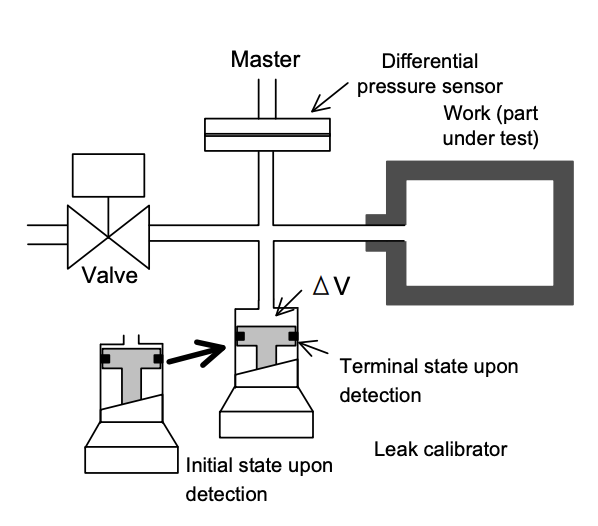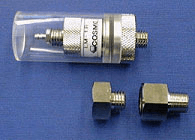In order to display the differential pressure in units of leak, it is necessary to measure the Equivalent Internal Volume. This is called Leak Calibration and is an important element for leak testers.
Measurement of Equivalent Internal Volume (Ve) using a volume change leak calibrator:
Start the leak tester in calibration mode to generate a constant volume change (ΔV) in the work measurement system during Detection. The tester detects the differential pressure (ΔP) generated and automatically calculates the Equivalent Internal Volume (Ve) of the target measurement system.
The measured Ve can be used to display in units of leak (e.g., mL/min).
Ve: Equivalent Internal Volume (mL) ΔV: Volume change (mL) ΔP: Differential pressure (Pa) P: Test pressure (kPa)

【Note】
Summary of Auto Leak Calibrator
- Calculates and displays the Equivalent Internal Volume of the work side.
- Has a means for calibrating the leak tester using this Equivalent Internal Volume. (K Check)
- Also displays the amount of leak as well as the differential pressure due to leak.
- Has a pass/fail judgment function based on the leak as well as the differential pressure.
Select a Leak Calibrator
Depending on the test conditions, calculate the volume change using the following equation and select the type of leak calibrator.
There are two types of calibrators: Auto Leak Calibrator that operates fully automatically and manual calibrators (LC type and QLC type) that are operated manually
ΔV: Volume change (mL) Ve: Estimated Equivalent Internal Volume (mL) P: Test pressure (kPa) ΔP: Differential pressure (Pa), Max. 1000 Pa
 Auto Leak Calibrator
Auto Leak Calibrator
Built into the leak tester and operates fully automatically.
 LC type
LC type
Turn the dial to generate a volume change in Detection.
* Cannot be operated depending on the test pressure.
 QLC type
QLC type
Just a touch of button can generate any desired volume change. Easy to operate and convenient for daily inspections. Can be operated with test pressure applied.
Select a Leak Calibrator that is closest to the ΔV full scale value (may be above or below full scale) obtained when ΔP is 1000 Pa.
Scroll。
| Test conditions | Auto leak calibrator | Manual leak calibrator | |||||
|---|---|---|---|---|---|---|---|
| Type LC | Type QLC | ||||||
| WORK volume | Test pressure | Model | F.S. | Model | F.S.※ | Model | F.S.※ |
| Small | Medium/High | ALC-05 | 0.5 mL. | – | – | QLC-0021 | 0.2 mL |
| Small / Medium | Low / Medium / High | ALC-1 | 1 mL | LC-12 | 1 mL | QLC-0101 | 1 mL |
| Small /Medium / Large | Low / Medium | – | – | LC-22 | 2 mL | – | – |
| Medium / Large | Low / Medium | ALC-4 | 4 mL | LC-42 | 4 mL | QLC-0401 | 4 mL |
| Large (option) | Low/Medium | ALC-10 | 10 mL | – | – | QLC-1001 | 10 mL |
* F.S. = full scale
K(Ve) Calibration using Leak Master

This function calculates the Equivalent Internal Volume by applying a certain amount of leak to the work measurement system.
Connect the Leak Master to the calibration port and start in calibration mode to calculate and display the K(Ve).
It is available on LS-1881A, LS-R902 and LS-R700.
The LS-1866 uses a Leak Master to calculate the flow coefficient and convert the differential pressure to leak volume.
Videos on Calibration with Leak Master
How to Select LM-1C J Series Leak Master
LS-R902 with Option J / How to Measure K(Ve) (Equivalent Internal Volume)【Procedure】
LS-R700 / How to Measure K(Ve) (Equivalent Internal Volume)【Procedure】
LS-1866 / How to Measure K(Ve) (Equivalent Internal Volume)【Procedure】